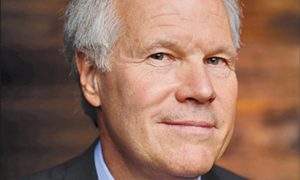London vice-chair among frontrunners as search begins for Latham's next leader
As Latham grapples with the shock departure of managing partner Bill Voge, who could be next to take the firm's helm?
March 23, 2018 at 09:15 AM
10 minute read
With Bill Voge out as chairman and managing partner of Latham & Watkins after an exchange of inappropriate messages with a woman not tied to the firm, the natural question follows: Who's likely to replace him, and how soon?
As it stands, the answer is far from clear. Voge, who had taken the leadership position in 2015 after a 2014 election to replace long-term leader Robert Dell, resigned on Tuesday (20 March) in light of what Latham described as "the exchange of communications of a sexual nature with a woman whom he has never met in person and who has no connection to the firm".
Latham went on to say in its statement that the two vice-chairs under Voge, Silicon Valley-based Ora Fisher and London-based Richard Trobman, a finance partner who became a vice-chairman in February 2017, would lead the firm as interim co-chairs.
As the firm grapples with Voge's sudden departure, which became public just a day before Latham was supplanted by Kirkland & Ellis as the world's largest law firm by revenue, it's possible that Fisher and Trobman might be considered as full-time replacements.
 Trobman (pictured), who also has been at Latham since 1991, balances his leadership role with an active practice that focuses on capital markets work, including securities offerings, restructuring, and M&A.
Trobman (pictured), who also has been at Latham since 1991, balances his leadership role with an active practice that focuses on capital markets work, including securities offerings, restructuring, and M&A.
Current and former Latham partners say that Trobman would be "great" in the role and that of late, he has become more prevalent in the management of the firm, making him a clear frontrunner.
He is described by those who know him as "a real leader and loyalist", as well as "hard-nosed when it comes to business", and "the most underrated partner by the market", with an "unbelievable" practice.
Fisher, meanwhile, has held multiple leadership roles at Latham during the nearly three decades since she joined the firm in 1991, although she is thought of as less likely to want the top role.
Fisher and Trobman are joined on Latham's current executive committee by six other partners: Washington-based white-collar lawyer Alice Fisher; New York-based corporate lawyer James Gorton; Chicago finance partner Brad Kotler; Orange County, California-based financial institutions litigator Michele Johnson; London-based corporate partner Martin Saywell; and New York corporate partner Lisa Watts.
There could, of course, also be competition from others, such as former executive committee members, a group that would include the two partners who were finalists in the election process that ultimately put Voge at the top of Latham's leadership: Jeffrey Greenberg, a project finance partner and managing partner of the firm's Los Angeles office who came in second to Voge in a run-off election in 2014; and Washington DC private equity partner Paul Sheridan, who was a third finalist in the run to succeed Dell.
As another alternative, Latham could opt to look outside of its longstanding leaders and senior partners and consider someone who has top leadership experience, someone such as Juan Picon, who was global chairman of DLA Piper before joining Latham in November. Picon now heads Latham's office in Madrid, but at DLA Piper he not only led an international legal enterprise as global chairman of the firm, but also was respected as a corporate rainmaker and a charismatic leader with extensive global management experience. Under Voge's leadership and Dell's before that, Latham has placed an emphasis on its international work and expanded its global reach.
However, it is unclear whether Picon would want the job. Aside from the fact that he has not been at Latham for long, DLA Piper said at the time of his departure from the firm that his decision was motivated in part by family considerations, as the demands of a management role at a global firm saw him spend more than half of his time away from his Madrid home.
One other name put forward as a potential contender by market sources is corporate partner Charles Ruck, who splits his time between New York and Orange County and is a former member of the firm's executive committee and chair of its strategic client initiative.
Aside from the question of who might take Voge's spot, there are also questions about the process, given the unusual circumstances. One Latham partner said there will be a formal vote and nominations, with the firm "starting with a wide field and then narrowing it down".
When Voge was elected to replace Dell in 2014, the leadership transition involved a months-long process.
Some 38 candidates threw their hats into the ring initially, and as that number was winnowed down, the three finalists – Voge, Sheridan and Greenberg – embarked on an intense tour of the firm's different offices. Their roadshow involved meeting with partners throughout the firm while also juggling their daily practice responsibilities. In the end, after about eight months of campaigning, all three told The American Lawyer that they believed the process was transparent, open and gave Latham partners a full chance to participate.
"Partners in our firm now really own and embrace their decision," Voge said at the time.
In any event, whatever process Latham goes through to replace Voge will be happening earlier than the firm expected. Voge, who was 57 when elected chairman, said in 2014 that he planned to stay through one five-year term. That would have ended almost two years from now, at the start of 2020.
 Voge's abrupt resignation has left many at the firm and within the wider industry scratching their heads. One Latham partner described his departure as "a tragedy". "Bill was a champion of diversity – my boss is now a woman, our London office head is a woman," he said. "That was all done by Bill."
Voge's abrupt resignation has left many at the firm and within the wider industry scratching their heads. One Latham partner described his departure as "a tragedy". "Bill was a champion of diversity – my boss is now a woman, our London office head is a woman," he said. "That was all done by Bill."
At Latham, Voge balanced his leadership responsibilities with roles on the boards of several non-profit organisations, including at least two groups rooted in Christianity.
And, long before he entered the world of Big Law, Voge had a modest upbringing on a farm in Iowa and became the first in his family to attend college – humble roots that he sometimes referenced in public speaking events and media interviews after taking the helm at his firm.
Yet, as Latham put it, Voge stepped down after engaging in conduct that, "while not unlawful, the executive committee concluded was not befitting the leader of the firm". A Law360 article regarding Voge's resignation described a series of exchanges with an unnamed woman that initially involved lewd text messages and escalated to threatening comments aimed at the woman and her family.
Many details about the circumstances that led to Voge's departure remain murky. But it is clear that Latham found the conduct serious enough to accept Voge's resignation and Voge felt compelled to apologise in a statement of his own on Tuesday, citing a "personal mistake" and "lapse of judgement".
Voge started at Latham as a young associate in 1983, after earning a law degree and an MBA from the University of California, Berkeley. While still an associate, he was one of a small group of Latham lawyers who launched the firm's New York office. After his election to partner in 1991, Voge built a reputation at the firm as a rainmaker in the global project finance group who was qualified in both US and English law and who served in Latham's New York, London and San Diego offices at various points during his career.
Between 1998 and 2002 and again from 2008 to 2012, Voge was elected to the firm's executive committee; between 2007 and 2008, he also headed the global finance department. He also played a key role in spearheading the opening of the firm's Middle East offices.
His rise into the upper echelons of the legal industry stands in contrast to an early life marked by humbler beginnings. Brought up on a farm in Iowa, Voge spent time in the US Army during the 1970s and was the first in his family to attend college – a background he appears to have discussed at a Yale Law School event last April and at his law school alma mater in Berkeley, California, in October.
While Voge's exposure in the press generally stemmed from his role at Latham, he also appears to have had an active life outside the firm, particularly in connection with several non-profit organisations. Voge previously sat on the board of directors and headed up Latham's partnership with Not For Sale, a group focused on combating modern-day slavery and forced labour.
He also served as a director of Christian Camps and Conferences, an organisation that runs Christian faith-based youth summer camps in Maine and New Hampshire. His role for that group included serving as chairman of a fundraising campaign that raised millions of dollars for the non-profit, according to the organisation's website. His wife, Jami Voge, has also held a leadership position at a Christian non-profit called Awakening to God, serving on the board of directors for the California-based ministry group.
Ultimately, it appears that Voge's connections to another group – a Christian men's organisation called the New Canaan Society – might have led to his downfall at Latham. It was reportedly through his connection with the society, where Voge had been on the board of directors, that the he first made contact with a woman with whom he later exchanged inappropriate messages. That initial conduct was intended to help arrange a 'Christian reconciliation' with a separate New Canaan Society member. From there, however, the reported contacts between Voge and the woman deteriorated.
The New Canaan Society began in 1995 when founder James Lane – a former Goldman Sachs general partner – began hosting a bible study and Christian fellowship group at his home in Connecticut. Describing the group, Lane told the New York Times in 2006 that it was "a group of men who love each other and love Jesus".
The organisation eventually expanded to more than 50 local chapters across the US. On its website, the New Canaan Society bills itself as a "a group of men who gather to encourage each other in friendship and faith and to support each other to be better husbands, fathers – and better men – in the marketplace and in our communities".
Voge had been on the board of directors of the group as recently as September, when he was scheduled to give a speech at a New Canaan Society event. As of Wednesday, however, he is no longer listed on the group's website.
Additional reporting by Anna Ward.
This content has been archived. It is available through our partners, LexisNexis® and Bloomberg Law.
To view this content, please continue to their sites.
Not a Lexis Subscriber?
Subscribe Now
Not a Bloomberg Law Subscriber?
Subscribe Now
NOT FOR REPRINT
© 2025 ALM Global, LLC, All Rights Reserved. Request academic re-use from www.copyright.com. All other uses, submit a request to [email protected]. For more information visit Asset & Logo Licensing.
You Might Like
View All
KPMG's Bid To Practice Law in US On Hold As Arizona Court Exercises Caution

Combative Arguments at EU's Highest Court Over Google's €4.13B Antitrust Fine Emphasize High Stakes and Invoke Trump
4 minute read
Law Firms 'Struggling' With Partner Pay Segmentation, as Top Rainmakers Bring In More Revenue
5 minute readTrending Stories
- 1Uber Files RICO Suit Against Plaintiff-Side Firms Alleging Fraudulent Injury Claims
- 2The Law Firm Disrupted: Scrutinizing the Elephant More Than the Mouse
- 3Inherent Diminished Value Damages Unavailable to 3rd-Party Claimants, Court Says
- 4Pa. Defense Firm Sued by Client Over Ex-Eagles Player's $43.5M Med Mal Win
- 5Losses Mount at Morris Manning, but Departing Ex-Chair Stays Bullish About His Old Firm's Future
Who Got The Work
J. Brugh Lower of Gibbons has entered an appearance for industrial equipment supplier Devco Corporation in a pending trademark infringement lawsuit. The suit, accusing the defendant of selling knock-off Graco products, was filed Dec. 18 in New Jersey District Court by Rivkin Radler on behalf of Graco Inc. and Graco Minnesota. The case, assigned to U.S. District Judge Zahid N. Quraishi, is 3:24-cv-11294, Graco Inc. et al v. Devco Corporation.
Who Got The Work
Rebecca Maller-Stein and Kent A. Yalowitz of Arnold & Porter Kaye Scholer have entered their appearances for Hanaco Venture Capital and its executives, Lior Prosor and David Frankel, in a pending securities lawsuit. The action, filed on Dec. 24 in New York Southern District Court by Zell, Aron & Co. on behalf of Goldeneye Advisors, accuses the defendants of negligently and fraudulently managing the plaintiff's $1 million investment. The case, assigned to U.S. District Judge Vernon S. Broderick, is 1:24-cv-09918, Goldeneye Advisors, LLC v. Hanaco Venture Capital, Ltd. et al.
Who Got The Work
Attorneys from A&O Shearman has stepped in as defense counsel for Toronto-Dominion Bank and other defendants in a pending securities class action. The suit, filed Dec. 11 in New York Southern District Court by Bleichmar Fonti & Auld, accuses the defendants of concealing the bank's 'pervasive' deficiencies in regards to its compliance with the Bank Secrecy Act and the quality of its anti-money laundering controls. The case, assigned to U.S. District Judge Arun Subramanian, is 1:24-cv-09445, Gonzalez v. The Toronto-Dominion Bank et al.
Who Got The Work
Crown Castle International, a Pennsylvania company providing shared communications infrastructure, has turned to Luke D. Wolf of Gordon Rees Scully Mansukhani to fend off a pending breach-of-contract lawsuit. The court action, filed Nov. 25 in Michigan Eastern District Court by Hooper Hathaway PC on behalf of The Town Residences LLC, accuses Crown Castle of failing to transfer approximately $30,000 in utility payments from T-Mobile in breach of a roof-top lease and assignment agreement. The case, assigned to U.S. District Judge Susan K. Declercq, is 2:24-cv-13131, The Town Residences LLC v. T-Mobile US, Inc. et al.
Who Got The Work
Wilfred P. Coronato and Daniel M. Schwartz of McCarter & English have stepped in as defense counsel to Electrolux Home Products Inc. in a pending product liability lawsuit. The court action, filed Nov. 26 in New York Eastern District Court by Poulos Lopiccolo PC and Nagel Rice LLP on behalf of David Stern, alleges that the defendant's refrigerators’ drawers and shelving repeatedly break and fall apart within months after purchase. The case, assigned to U.S. District Judge Joan M. Azrack, is 2:24-cv-08204, Stern v. Electrolux Home Products, Inc.
Featured Firms
Law Offices of Gary Martin Hays & Associates, P.C.
(470) 294-1674
Law Offices of Mark E. Salomone
(857) 444-6468
Smith & Hassler
(713) 739-1250










